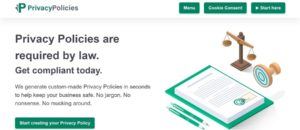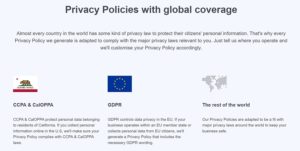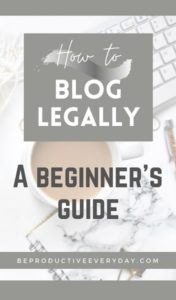
Blog Legally: 5 Legal Pages Your Website MUST Have
Many beginner bloggers are not aware of the law’s requirements to blog legally when they start their blogs. In addition, they don’t know about the legal pages that every blog MUST have.
If you are one of these bloggers, I’m sorry to inform you my friend, but you can get in big trouble with the law — and even miss profitable partnership opportunities for your business blog.
Depending on which law you break, some penalties can be as hefty as $43,792!
So, to avoid getting into legal trouble (and to protect YOUR rights as a blogger as well), read carefully this beginner-friendly guide to blog legally. Also, in this article, you’ll become aware of the legal pages you can’t put off tomorrow to add to your blog or website.
This page contains affiliate links. If you purchase through our links, we get a commission at no cost to you. Read the full disclosure here.
If you want to start a blog that makes money but have no previous experience blogging and no coding skills, check out this step-by-step guide to quickly get started today!
Legal Disclaimer: The following advice comes from my 7+ years of experience as a blogger and my nearly 5 years of making a living as a full-time blogger. I’m not a lawyer, though. And, particularly, I’m not your lawyer (not trying to be rude, it’s just that each case tends to have its own particular needs). So don’t take this article as a piece of professional legal advice.
I have a lawyer who has been helping me throughout my career as a blogger and, through what I have learned from her, I intend to help beginner bloggers to start their blogs on the right path to blog legally and add all the legal pages required by law to their blogs and websites.
For verified legal advice when creating your legal pages to blog legally, please check PrivacyPolicies.com.
Why Do You Need to Blog Legally?
“Blogging is not such a serious thing, after all, even teenagers have blogs!” “Why do I have to worry about blogging legally?” “The law has nothing to do with the blog I created in the comfort of my kitchen chair, right?”
Wrong.
It doesn’t matter if you blog as a hobby, to earn some extra bucks, or if you have a more ambitious goal of making your blog a full-time job. There are legal implications for you as a blogger and website owner.
And, as a blogger, you definitely don’t want to get into legal trouble that will cause headaches. And cost you money — a lot of money.
So, to blog legally and stay out of trouble with the law, your website must be up to date with the laws that regulate common blogging practices.
The aforementioned laws regulate:
- Data collection
- Marketing practices (to ensure they’re not misleading the customers)
- Profitable partnerships that bloggers have with companies
- Among others
The Institutions & Practices a Blogger Must Be Aware Of to Blog Legally
Federal Trade Commission (FTC) — US Agency
An independent agency of the United States government, the Federal Trade Commission is a U.S. antitrust law that protects the consumer.
The FTC regulates advertising and marketing practices in order to protect the consumer from fraudulent practices and suspicious business.
The FTC is a bipartisan federal agency with a unique dual mission to protect consumers and promote competition.
(…)
We collaborate with law enforcement partners across the country and around the world to advance our crucial consumer protection and competition missions. And beyond our borders, we cooperate with international agencies and organizations to protect consumers in the global marketplace.
Click here to visit The FTC About Page and learn more.
Organizations such as the FTC exist to protect the rights of consumers. To make sure your blog is legal, your site’s Privacy Policy must be legal and appropriate for your particular case. That’s when PrivacyPolicies.com becomes critical. PrivacyPolicies is a legal service that generates personalized legal documents for bloggers and website owners quickly at an affordable price. Check PrivacyPolicies.com here!
Privacy & Electronic Communications Regulations (PECR) — The UK’s Independent Authority
The Privacy and Electronic Communications Regulations (PECR) cover several areas related to consumer law and the several practices of data collection in the UK, ranging from the procedure of collecting emails and practicing email marketing to data collection used by third-party services such as Google Analytics. In addition to customer information collected in payment processing.
The Privacy and Electronic Communications Regulations (PECR) sit alongside the Data Protection Act and the UK GDPR. They give people specific privacy rights in relation to electronic communications.
Click here to learn more about PECR.
Canada’s Anti-spam Legislation (CASL)
Like the FTC and PECR, Canada’s anti-spam legislation (CASL) exists to enforce online data collection and digital marketing practices and to protect consumer rights.
Canada’s anti-spam legislation (CASL) protects consumers and businesses from the misuse of digital technology, including spam and other electronic threats. It also aims to help businesses stay competitive in a global, digital marketplace.
Important details to be aware of to blog legally:
FTC, PERC, and CASL are just three of the many agencies and institutions that regulate commonly applied blogging practices. Whether the demands of any of these three institutions apply to you depends on where you legally reside and where your website or blog users and customers reside.
In case you don’t live in the US, the UK, or Canada, to blog legally you need to research as soon as possible which is the equivalent institution in your country and the countries of your website users. That’ll be the only way to be up to date with the law, according to your local requirements.
How does this apply to you as a blogger and how can you blog legally?
It depends on which practices you adopt on your website since each practice requires different procedures. Read on to find out which blogging practices are enforced by the law and what your role as a blogger is in relation to these laws.
The Law Requires You to Inform Your Website Visitors Which Data Is Collected On Your Site
There are several ways in which your website collects data. To mention a few:
- The age and location of your website users collected by third-party services such as Google Analytics.
- The emails and names provided by your site users when they choose to receive your newsletter or download a freebie.
- Address and credit card details that are provided by your customers when they purchase a product or service on your website.
- Cookies used by Ad Networks or Affiliate Programs.
It is your obligation to inform users of your website about all data collection practices that take place on your site, whether by yourself or by a third-party service.
To blog legally, you must also make it clear that users of your website have the right to opt out of any service they have subscribed to and/or to request their data to be deleted.
All of this information must be stated on your Privacy Policy page, which is a must-have legal page we’ll talk about in a moment!
How to Blog Legally When You Do Email Marketing
If you collect information such as names and emails through services like OptinMonster or WPForms intending to do email marketing, you need to be up to date with the CAN-SPAM Act requirements to blog legally.
Failure to comply with the requirements of the CAN-SPAM Act can cost you dearly:
Each separate email in violation of the CAN-SPAM Act is subject to penalties of up to $43,792, so non-compliance can be costly.
— Federal Trade Commission (FTC)
But please, don’t despair! Blogging legally according to the CAN-SPAM Act requirements is not difficult!
You just must be sure that all the emails you send to your subscribers clearly contain:
- The “Unsubscribe” option (you can also add a reminder that the subscriber is receiving this email for having subscribed to [insert blog post/page here])
- A valid physical address from where your business operates
But you’re just starting out, so you probably don’t have a business address yet. So your business address is your home address.
Obviously, giving away your home address to your website readers is insane and not recommended at all. So your best option is to acquire a Virtual Address such as US Global Mail, which is a common and legal practice when it comes to online business.
Related: US Global Mail Review: Is this virtual address worth it?
Click here to learn more about Virtual Addresses and the CAN-SPAM Act requirements.
How to Blog Legally When Partnering with Affiliate Programs
To participate in affiliate programs while blogging legally, you need to display a CLEARLY VISIBLE Affiliate Disclosure on your website.
In other words, it’s illegal to hide the affiliate disclosure somewhere on your site that nobody will likely see. Preferably, add your “this page may contain affiliate links, for details click here” at the top of your pages and blog posts with a link to the page that clearly explains your affiliate practices with your business partners.
This is a requirement that every company will require to approve you as an affiliate.
By the way, never forget to read carefully the Affiliate Guidelines of each company you become an affiliate with.
Copyright Infringement
Copyright infringement has been a major headache for brand owners, intellectual property owners, and content creators as so many people behave as if the Internet is a lawless land.

But the thing is, copyright infringement is a crime. And, just as you don’t want anyone else using your photos, articles, and overall content without your permission, you also must not use other creators’ content without their prior authorization. Otherwise, you might be sued for infringement of intellectual property.
Here’s the creative content that often suffers from copyright infringement in blogging (and that you need to be aware of to blog legally):
-
Photos:
Even though your blog needs high-quality photos that communicate your website’s identity to your audience, never use others’ photos if you do not have their legal permission to.
If you don’t have the time/will/skills to produce photos yourself, what you must do to blog legally is to make good use of a photo stock service that allows you to use their photos on your website, social media, and promotional materials.
You can blog legally and safely using a photo stock such as Unsplash, which has both free and paid pictures to make your site visually pleasing!
-
Citations:
Here and there you will quote a passage from an informative blog post to lend credibility to your own article. In these cases, be sure to always place a backlink to the original article.
If the owner of the original article has a problem with your article and contacts you to remove the passage, just remove the citation immediately. Then look for another similar article to complete your post and move on. It’s not the end of the world.
Note that this is very unlikely to happen. I am informing you of this possibility just in case, you know.
-
Illustrations/Graphics:
Graphics are often needed to create:
- Descriptive graphics
- Freebies to encourage your audience to subscribe to your mailing list
- PINS for Pinterest
- Customize your blog in general.
-
Trademarks:
Do not use trademarks in your promotional material, much less in your domain name!
There’s not much more to be said here. Just don’t mess with the big fish in the pond, that’s it.
-
Negative Reviews:
Be careful if you intend to write negative reviews, especially the ones carrying a very aggressive tone. If you provide information that doesn’t match the truth, you could end up getting in trouble with some of the big guys.
Don’t forget that negative reviews might ruin the business of others. So the injured will certainly take action if this is hurting their business.
-
Fair use:
In its most general sense, a fair use is any copying of copyrighted material done for a limited and “transformative” purpose, such as to comment upon, criticize, or parody a copyrighted work. Such uses can be done without permission from the copyright owner. In other words, fair use is a defense against a claim of copyright infringement. If your use qualifies as a fair use, then it would not be considered an infringement.
— Fair Use | Stanford.
Since “transformative use” is such an ambiguous statement, giving you generic advice could be fatal.
So, if your site relies heavily on “fair use”, such as pop culture commentary/reviews websites, visit this page here to learn more about fair use. If this resource does not bring clarity about the situation of your site content, the best thing you can do to blog legally is to consult a lawyer to analyze your blog content and give you specific, legal advice.
YOUR Rights As A Blogger
Blogging legally also includes YOUR rights as a website owner.
You can protect your rights by:
- Registering the copyright of your website
- Trademarking your website
- Opening an LLC
For all of the above procedures, you will need a lawyer to guide you on the best option for your situation and your future goals, and to explain to you what ups and downs will come with each choice.
Taxes You Must Pay to Blog Legally
I have been self-employed since I started working when I was 17 years old. I have very little knowledge about how bureaucracy works when you have a “traditional” job.
Now, if you are the complete opposite of me, you will probably find some things a little different in this blogging business.
But the thing is, when you start receiving your payments, whether from affiliate programs, Ad Networks, or whatever method you use to make money as a blogger, you must remember that part of this money is not yours!
Part of this money will go towards paying your taxes. How much, well, will depend on which country and/or state you reside in and where the money you are getting comes from.
Depending on your country’s partnership with the country the payment is coming from, there will likely be an extra tax to be paid.
In other words, each case is different. You will have to check your specific condition. But, as a rule of thumb, saving 30% of your earnings to pay the taxes is still standard. (Although it can be more or less depending on your condition, as mentioned above.)
The legal forms you must fill out to receive payments from some paid partnerships
You will be required, in many cases but mostly when participating in affiliate programs, to fill in a legal document regarding your nationality and the taxes you are responsible for paying.
You must fill out the legal forms to blog legally. If you do not, the companies will not be able to pay your commissions.
I cannot say exactly what documents are required in each country, and what practices each country has with residents of other countries. But in my case, the vast majority of companies for which Be Productive Every Day is an approved partner are from the United States.
Furthermore, the US probably concentrates the majority of options within the affiliate marketing industry. So I will focus here on informing you which legal forms are required to receive payments from US-resident companies, whether you are a US resident or not.
(For other countries you will have to check specifically what accords your country has with the country from which your payment will come.)
So, in the US, the legal forms that must be filled out are:
W-9 Form: Required for US-resident individuals and companies who will receive payments from US-resident companies.
W-8BEN Form: Required for non-US-resident individuals who will provide services and receive payments from US-resident companies.
W-8BEN-E Form: Required for non-US-resident entities who will provide services and receive payments from US-resident companies.
If you’ve never filled out any legal forms before, don’t be scared. You’ll easily be able to blog legally.
You will only have to fill in a few fields with personal information such as your full name, country of citizenship, and address (this time, it cannot be a P.O. Box address!).
Lastly, you must sign your name digitally.
It takes no more than 5 minutes, and often the form is approved immediately. Depending on which company you will be working with, approval can take anywhere from 3 days to a week.
You may want to turn your blog into an LLC
Many bloggers open an LLC for their blogs(s). Some services even help you open an LLC in strategic US states (meaning states where taxes are lighter) even if you are not a US resident.
Turning your blog into an LLC can be extremely beneficial in some cases. In others, not so much. You will have to consider your situation delicately, with the help of a lawyer. This is advantageous for some cases, but less so for others, as there is no guarantee that opening an LLC will make you pay fewer taxes.
Actually, this may make you have to pay even more. 😐 So I cannot say that opening an LLC will or will not bring you any financial advantage.
But don’t worry about it now! Focus on growing your blog audience with quality content, fill in the legal forms correctly, pay your taxes, and make money!
Decide whether opening an LLC is a good option for your business once your blog is sustainably making money.
The 5 Legal Pages Your Blog Must Have So You Can Blog Legally
Note that you must not copy and paste the legal pages from other blogs and websites! This is a crime and you can be sued by the website owner or the lawyer/service that wrote the legal page. Furthermore, another website’s legal page is useless to you! It won’t help you to blog legally as each case is different. You need specific protection for your case and your website.
And one more thing: do not write these legal documents yourself if you’re not a lawyer (which I assume you aren’t since you’re reading this article).
You bet that you will leave holes in the document that could get you into tricky situations in the future.
The same can be said about the template that comes with WordPress.
I advise you to use PrivacyPolicies.com to generate your legal pages, which is a legal online service to create personalized legal pages for websites.

Also, PrivacyPolicies.com doesn’t do templates at all! Every single legal document they generate is unique, built around the information you provide them. They consider many factors such as your industry, in which country you operate, and the technology you use to make sure that your Privacy Policy has you covered as much as possible!

1. Privacy Policy
Privacy Policy is the legal document that informs your website users what data is collected within your website, how this data is collected, and what is done with this information.
The Privacy Policy is also required when you work with affiliate programs and Ad Networks, and when you use third-party services such as Google Analytics or Paypal.
Your Privacy Policy page must contain:
- Which data is collected on your website (i.e. names, email addresses, IP addresses, credit card details, etc.)
- Which methods do you use to collect such data (i.e. Google Analytics, Ad Networks, email list sign-up forms, etc.)
- Why do you collect this data (i.e. to better understand your audience, for email marketing purposes, etc.)
- Who do you share this data with and why (i.e. Paypal or Stripe, if you use a third-party payment gateway on your website, etc.)
2. Terms & Conditions of Use
The Terms & Conditions page is there to protect you, your intellectual property, and the rules you set for your site.
Your Terms & Conditions page must contain:
- Your intellectual property rights
- The rights and obligations of the users of your website
- The guarantee of your rights to terminate any type of right to use your website for any users
- The guarantee of your rights to make any changes at any given time
3. Disclaimer
The Disclaimer page exists to protect you by stating that you do not take legal responsibility for anything posted on your blog or website.
Your Disclaimer page must state that:
- There is no guarantee of success for any advice given on your website
- You accept no liability for your blog content or third-party links
- The content of your website is not equivalent to any legal or professional advice
4. Affiliate Disclosure
Your Affiliate Disclosure is required before you can be approved to work with affiliate programs, as the law requires you to clearly inform your blog readers that you get paid for some of the recommendations you provide.
You must have a page detailing that you have partnerships with some companies that pay you a commission for recommending their services or products to your readers and that this commission has no additional cost to the final buyer (in this case, your website visitors).
In addition to this page, a short version of this affiliate disclosure is required to appear clearly visible on each and every page or blog post that has an affiliate link.
5. Return & Refunds
If you sell your own physical products (which does not include affiliate sales or money earned by displaying ads), you must clearly state which rights your customers have to exchange or return purchased items.
Now, if you only sell digital products, which usually do not have a money-back guarantee, be sure to inform that your digital products do not have a money-back guarantee – or even returns, no matter how obvious it is – and that the person who paid for the product will receive the download without trouble so that you are not sued for deceptive practices.
Organizations such as the FTC exist to protect the rights of consumers. To make sure your blog is legal, your site’s Privacy Policy must be legal and appropriate for your particular case. That’s when PrivacyPolicies.com becomes critical. PrivacyPolicies is a legal service that generates personalized legal documents for bloggers and website owners quickly at an affordable price. Check PrivacyPolicies.com here!
A Beginner’s Guide to Blog Legally — Final Words
I hope this not-so-quick coverage on blogging legally has helped you to gain knowledge of what implications apply to you as a blogger and how to take the basic steps to protect yourself and your blogging business.
Be sure to check PrivacyPolicies.com to generate for your blog or website all the must-have legal pages customized specifically for you, and for a very affordable price. This way will be able to blog legally, safely, and peacefully!
Sharing is caring! Share on Pinterest!
If this article was helpful to you, would you consider sharing it on Pinterest? This helps others who may also benefit from this information, as well as helping us to spread the word about this quality content that we always strive to create for you. Thank you!






2 Comments
A.
Great info!
Andie
Thanks, A.!